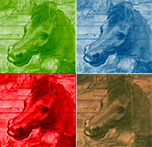The Heritage Laboratory of the Swedish National Heritage Board is a central facility for interdisciplinary collaborations in heritage science. The Heritage Laboratory has a special focus on conservation science, conservation materials testing, technical art studies and cultural heritage object documentation within the areas of collection management, building management and archaeology. We use experimental and analytical techniques to examine, document and identify materials, to study their ageing and characteristic properties and to test and develop conservation methods. All laboratory spaces have particle filtered clean air and are fully climate controlled at 50% ±5% relative humidity and 21°C ± 3°C. A separate space for mechanical material analysis is available, permitting even more stringent climate control. Many of the analytical and monitoring instruments are portable and also allow for non-invasive analyses. Our analytical instruments include variable pressure scanning electron microscopy with energy dispersive X-ray spectroscopy (VP-SEM/EDS), FTIR with ATR and imaging, Raman spectroscopy, polarized UV-Vis transmission light microscopy, spectrophotometry, technical photography, multispectral imaging, micro X-ray fluorescence (µXRF), X-ray and tensile testing. The laboratory includes conservation equipment for a variety of purposes available for research and development, including large-scale freezing down to -30°C, air abrasion, desalination, vacuum and anoxia packing, nebulisation, textile washing and dyeing machines, metal working, etc. The laboratoty routinely carries out Oddy tests for assessment of materials used in the storage, display or transport of cultural heritage objects. The Heritage Laboratory also has archival space for reference collections consisting of paint, pigment and other material samples, as well as short term secure storage spaces with adjustable climate control. Depending on the research requested any of the laboratorie's resources may be made available and accessible to our IPERION HS users for the duration of their trans national access (TNA) projects.
IPERION HSIntegrated Platform for the European Research Infrastructure
